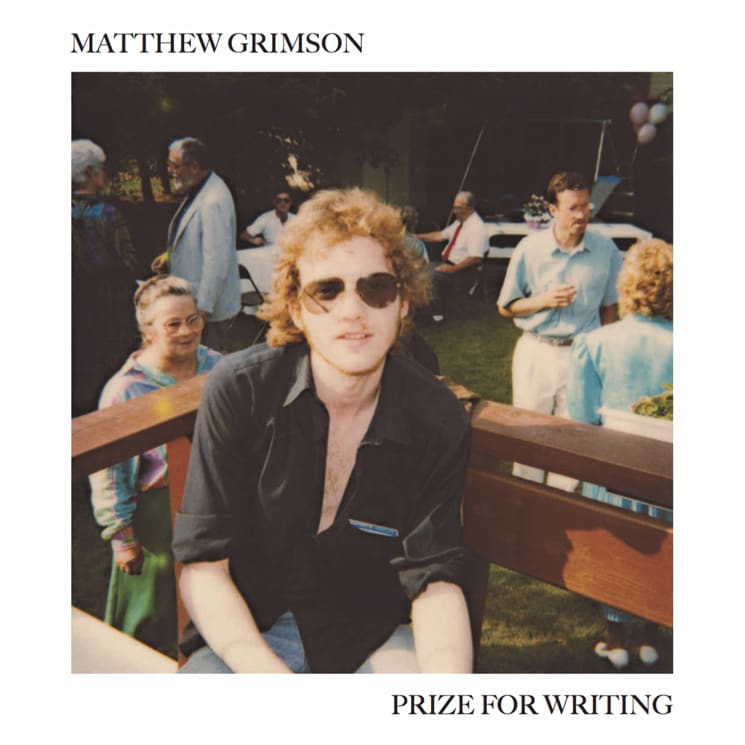It's a late July evening in 2018, and there's barely room to stand in Gus' Pub — an unofficial landmark in Halifax's live music scene. From the small slice of stage in the corner of the bar, singer Joel Plaskett addresses the crowd, a guitar cradled against his chest. "I was 16," Plaskett says, "and Matt would have been about 23." Plaskett, like everyone else here, has come tonight to remember Matthew Grimson — a local singer-songwriter who passed away just a few weeks before at the age of fifty.
It's fitting that Grimson would be remembered in a room like this. After all, the artist was best known as a figure in Halifax's independent music community, his knotty lyricisms aired into scattered venues around the area. During his life, Grimson's work had an intense regional specificity — carried only as far as an amplifier could reach, remaining largely unheard outside of his hometown.
With Prize for Writing — a posthumous collection, as well as the artist's first release on 12-inch vinyl — Grimson's work at last assumes form. The album provides a fortunate chance for his songs to be heard and held widely, in a way they seldom were during his life. What emerges is a rare, rambling collection, with lyrics that bite and give in the same breath, extending a welcome invitation to a unique talent in Canadian songwriting.
Co-curated as a "labour of love" by Plaskett alongside Chris Murphy of Sloan, the raw materials for the record date from a recording session of Grimson's in 1995. As a general rule, the volume is loud, the production is brash. Most tracks are slim — often expiring before the two-minute mark — but deceptively roomy, holding worlds in their detailed dioramas of emotional states.
In constructing these scenes, Prize for Writing makes good use of Grimson's greatest asset: a precise intuition for the weight and shape of an image. When sharpest, his writing is at once concrete in its references — late-night bars, fortune cookies, a Christmas wreath — and amorphous in its meanings. "I'd like to eat your apple on a Saturday night / I'd like to ride your appaloosa on the Isle of the Wight," he sings on "Get Lost Helen of Troy." There's a loose, associative logic to these lines that's not unlike how poet Kenneth Koch describes the best of poetry, as allowing "a nonsensical statement… to be something — even in a certain way to be memorable."
It's tempting to hear Prize for Writing as chiefly a thing of memory — an archival document permitting Grimson's work to be recalled by those who knew him, discovered by those who didn't. And though the release generously fills this retrospective role, viewing it in this light obscures how alive — how present — these songs still feel. When Grimson delivers simple, indisputable lines like, "I feel good, at this place, at this time," you believe him. After all, the goodness he's talking about is right there with you — reaching whatever place, whatever time you might be tuning in from.
(murderecords/New Scotland)It's fitting that Grimson would be remembered in a room like this. After all, the artist was best known as a figure in Halifax's independent music community, his knotty lyricisms aired into scattered venues around the area. During his life, Grimson's work had an intense regional specificity — carried only as far as an amplifier could reach, remaining largely unheard outside of his hometown.
With Prize for Writing — a posthumous collection, as well as the artist's first release on 12-inch vinyl — Grimson's work at last assumes form. The album provides a fortunate chance for his songs to be heard and held widely, in a way they seldom were during his life. What emerges is a rare, rambling collection, with lyrics that bite and give in the same breath, extending a welcome invitation to a unique talent in Canadian songwriting.
Co-curated as a "labour of love" by Plaskett alongside Chris Murphy of Sloan, the raw materials for the record date from a recording session of Grimson's in 1995. As a general rule, the volume is loud, the production is brash. Most tracks are slim — often expiring before the two-minute mark — but deceptively roomy, holding worlds in their detailed dioramas of emotional states.
In constructing these scenes, Prize for Writing makes good use of Grimson's greatest asset: a precise intuition for the weight and shape of an image. When sharpest, his writing is at once concrete in its references — late-night bars, fortune cookies, a Christmas wreath — and amorphous in its meanings. "I'd like to eat your apple on a Saturday night / I'd like to ride your appaloosa on the Isle of the Wight," he sings on "Get Lost Helen of Troy." There's a loose, associative logic to these lines that's not unlike how poet Kenneth Koch describes the best of poetry, as allowing "a nonsensical statement… to be something — even in a certain way to be memorable."
It's tempting to hear Prize for Writing as chiefly a thing of memory — an archival document permitting Grimson's work to be recalled by those who knew him, discovered by those who didn't. And though the release generously fills this retrospective role, viewing it in this light obscures how alive — how present — these songs still feel. When Grimson delivers simple, indisputable lines like, "I feel good, at this place, at this time," you believe him. After all, the goodness he's talking about is right there with you — reaching whatever place, whatever time you might be tuning in from.
